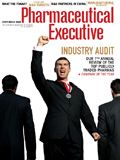Attack of the Junk
Pharmaceutical Executive
The United States makes the best medicines in the world. In days to come, that could be a problem.
On page 46 of this issue, consultant Zhu Shen describes the explosion of pharmaceutical activity in China, especially the burgeoning entrepreneurism of the "sea turtles"—Chinese who have lived and worked in the West before returning to start businesses in China. It's an impressive story, but one that ought to give the US industry pause.

Patrick Clinton
We've tended to think of China (and India, and other emerging parts of the world) as little more than a source of cheap labor and R&D, and as potential markets for Western products. I think the reality is likely to be more complex and a far greater challenge for US companies. Chinese pharma may not look like much today, but it's well positioned to give US giants a run for their money, maybe even topple them.
How could a scrambling, inexperienced drug industry gain the upper hand on established companies? The answer's a bit counterintuitive: China can potentially succeed by not doing as good a job as the US does.
Drugs sold in the United States and Europe met the highest standards of approval in the world. That makes them, by definition, the best. It also makes them outlandishly expensive to develop. As Chinese companies get rolling, they probably won't be able to gain approvals in the US for any except their biggest, most significant products. They won't have the expertise, and they won't necessarily have the capital to risk a billion dollars or more on a single drug.
What they will do is learn to develop drugs that work at Chinese price points. Those will rise as their economy grows, but in the short to middle run, they'll be low enough that US companies will have a hard time making money in China.
This won't be effected by low labor costs only; it will also be caused by the lower standards in the Chinese market than the US and Europe. And I don't mean this as an insult to China. Standards of safety and documentation reflect need. The US is clearly in a phase when a great many people think there are enough drugs, and they don't want to take many risks on new ones. In China, with 1.3 billion people (many of whom have been deprived of what we'd think of as decent healthcare) and a rising standard of living—and with all the heart disease, diabetes, and other chronic diseases that entails—it's easy to imagine people reaching a different conclusion.
The outcome? Within a decade or so, I'd expect to see the rise of a Chinese pharma industry (and an Indian, and maybe others) that may not be able to get products approved in the US or the EU, but can create new products at a fraction of the cost. They may not be the kind of medicines the US public is demanding today in terms of safety and documentation, but they'll work, and they'll be cheap.
What happens then will be interesting. Will the United States stick to its guns, or will it allow a flood of these new products into the country? Will US companies be able (or even willing) to adjust to new standards? Will overall healthcare be hurt, or perhaps even improved by cheap, "bad" drugs. And, of course, what will happen to the US industry?
I remember as a kid seeing a photo of one of the first Toyotas to be imported to the US. I asked my Dad, who worked in the auto industry, about it. "They're junk," he said. "The brakes don't work. They fall apart." Well, we all know how that story turned out. A similar tale is beginning for pharma. We need to make this one turn out better.
Patrick Clinton
Editor-in-chief

Addressing Disparities in Psoriasis Trials: Takeda's Strategies for Inclusivity in Clinical Research
April 14th 2025LaShell Robinson, Head of Global Feasibility and Trial Equity at Takeda, speaks about the company's strategies to engage patients in underrepresented populations in its phase III psoriasis trials.
Beyond the Prescription: Pharma's Role in Digital Health Conversations
April 1st 2025Join us for an insightful conversation with Jennifer Harakal, Head of Regulatory Affairs at Canopy Life Sciences, as we unpack the evolving intersection of social media and healthcare decisions. Discover how pharmaceutical companies can navigate regulatory challenges while meaningfully engaging with consumers in digital spaces. Jennifer shares expert strategies for responsible marketing, working with influencers, and creating educational content that bridges the gap between patients and healthcare providers. A must-listen for pharma marketers looking to build trust and compliance in today's social media landscape.
Pfizer, GSK Gain ACIP Recommendations for RSV and Meningococcal Vaccines
April 18th 2025The Centers for Disease Control and Prevention’s Advisory Committee on Immunization Practices voted to expand access to Pfizer’s respiratory syncytial virus vaccine Abrysvo for high-risk adults in their 50s and voted in favor of GSK’s meningococcal vaccine, Penmenvy, for streamlined adolescent protection.